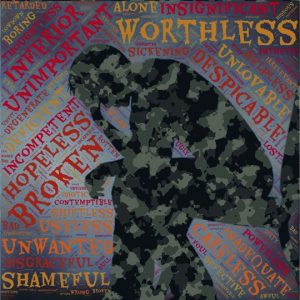 Do you carry your failures in your pockets, or do you have them tattooed on your skin? Which this is for you can be the difference between peace or chaos in your life. Some of us wear our failures like a second skin, the scales of a dragon that become a sort of comfortable cage. Others of us recognize that mistakes and failures are ours, and we own them, but they are not a part of us. They don’t make us who we are. Sometimes, the belief that we are our failures is buried so deep that the core belief has become the piece of sand that lies at the core of a pearl. Our entire identity is built on the idea that we’re a screw-up, a bum, that we deserve what we get.
Do you carry your failures in your pockets, or do you have them tattooed on your skin? Which this is for you can be the difference between peace or chaos in your life. Some of us wear our failures like a second skin, the scales of a dragon that become a sort of comfortable cage. Others of us recognize that mistakes and failures are ours, and we own them, but they are not a part of us. They don’t make us who we are. Sometimes, the belief that we are our failures is buried so deep that the core belief has become the piece of sand that lies at the core of a pearl. Our entire identity is built on the idea that we’re a screw-up, a bum, that we deserve what we get.
When you get to the place where your failures become your identity, you’re so far down a hole that you don’t even realize it.
It doesn’t have to be that way. Here are four things for us to remember in order to separate ourselves from our mistakes and failures, so that we may grow. Learn. Be a better version of our current selves.
We Are Not Our Mistakes or Failures
Making a mistake is something that humans do. Failing at something is what makes us learn. That’s not to say that we must fail to learn…we can learn from the failures of others, after all. But if we make our failures a part of us, it can keep us from learning, keep us from success. We can become trapped in a cage of our own construction, the mistakes and failures of our past holding us down like ropes and chains. Who we are is a result of the entirety of our lives, from birth up until this current moment, but we are not any more of a success because we once knocked a ball out of the park as we are a failure because we couldn’t hit it past the pitcher’s mound. If we tend to make our failures our identity, then we will have a tendency to look at ourselves in the mirror and see our failures written on our face in invisible ink. We stare into the eyes of the guy or gal looking back at us, and assume there’s something wrong with them. We carry blame and shame when blame and shame do nothing for us, but make us feel worse.
Remembering Our Mistakes is Not Reliving Our Mistakes
We’ve all done something cringe worthy. We all have those embarrassing moments that we wish people would forget, but they don’t. Worse than that, we have monumental failures, huge, life-changing mistakes. We did something to someone. We didn’t stop something from happening that we think we should have. Or we could have. We screwed up, royally, and we paid the price. Perhaps someone else paid the price, which is worse. It’s important to remember these mistakes, because if we forget them, or we’re not aware of them, we may make them again. We can’t help others learn from them. There is a big difference, though, between remembering the mistakes, acknowledging them, and reliving the mistake over and over again. That’s the difference between keeping the mistake in your pocket or tattooing it on your skin. If it’s in your pocket, you can take it out. Look at it. Consider it, what lead up to it, what the consequences were. You can put it on the table, separate from you, and observe it from different angles. We can detach the mistake from our sense of self, and remove the emotion from it. Then we can truly learn from it.
Not Reliving Our Mistakes is Not Absolving Us of Responsibility
Sometimes, we feel as though our mistakes are so horrible that we have to relive them, over and over, like a terrible unending nightmare. If we don’t keep doing that to ourselves, then it must mean that we’re not accepting responsibility for them. Since when does accepting responsibility for a mistake or a failure require us to relive them? Can’t we accept them, forgive ourselves, move on, AND acknowledge our failures? That we are flawed, fallible…human? Sure we screwed up. Probably big time. AND we can learn. Continuously beating ourselves up for a mistake in the past is counterproductive to healing. Would you re-break a broken arm, just to remind yourself not to break it again? No. You mend. You heal. Maybe not perfectly, probably with scars, but you heal.
Giving Power to Labels Takes Power from Ourselves
Loser. Trash. Garbage. Monster. Pathetic. The things we call ourselves are worse than we would ever let someone call someone we loved. If someone called my daughter, or my wife, the things I call myself, I’d punch them in the face. Why, then, do we say these things to ourselves? We are people who have lost, we’re not losers. We may have done horrible things, but that doesn’t make us horrible. We may have chosen to act like garbage, but that doesn’t mean that we are garbage. It’s a fine line, of course, but it’s the difference between continued pain and suffering and eventual healing. It’s a small shift in the way that we think, but the shift of one degree at the beginning of a journey can change our eventual destination by miles.
It’s a deliberate focus on keeping our mistakes and failures separate from who you are, from your core sense of self. It’s a focus on making sure that you learn from your failures, that you grow, instead of continue to beat yourself up.
You make mistakes and have failures, you are not your mistakes and failures.

The Head Space and Timing Blog is supported by the Colorado Veterans Health and Wellness Agency, a 501(c)3 Nonprofit in Colorado Springs, Colorado. The goal of the CVHWA is to provide military culturally competent mental health counseling to veterans and their spouses, regardless of characterization of discharge, time of service, or era of service. Our vision is to assist veterans to identify and remove barriers to their mental, physical, emotional, and behavioral wellness. For questions or inquiries, contact us!


